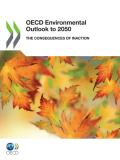
Based on joint modelling by the OECD and the Netherlands Environmental Assessment Agency (PBL), this document looks forward to the year 2050 to find out what demographic and economic trends might mean for the environment if the world does not adopt more ambitious green policies. It also looks at what policies could change that picture for the better. This Outlook focuses on four areas: climate change, biodiversity, freshwater and health impacts of pollution, identified as 'red light' issues by the previous 'Environmental Outlook to 2030' publication. This summary was prepared by Eldis.
Climate change (CC) adaptation and mitigation are identified as priorities in the Updated 2004 – 2010 Medium -Term Philippine Development Plan (MTPDP), in the light of increased occurrence of extreme weather events that are disturbing not only communities and livelihoods, but also the natural resource base, thereby critically threatening the pace of economic growth and development. Recognizing this, the Climate Change Act 1 of 2009 mainstreams CC adaptation and mitigation into government policies.
Against this background, the Philippine Government through its Department of Trade and Industry (DTI) requested GTZ to integrate measures for CC mitigation and adaptation into the Micro, Small and Medium Enterprises (MSME) Development Strategy for the period 2010 to 2016.
The Asia-Pacific Regional Human Development Report (APHDR) focuses on the need for the region to find ways to continue to grow economically, while reducing poverty and tackling climate change and environmental concerns. The report addresses climate challenges facing small island developing states (SIDS) in the region with special attention given to the least developed countries (LDCs), including Kiribati, Samoa, Solomon Islands, Timor-Leste, Tuvalu and Vanuatu. The report assesses climate change impacts from the perspectives of mountain dwellers, delta communities, islanders, indigenous and tribal peoples and the urban poor.
This summary was prepared by Eldis.
This report was launched at the first Global Human Development Forum which brought together high-level experts from governments, corporations, civil society and international organizations to examine the global policy changes required to ensure a sustainable future for people today and for generations to come. The report, supported by 13 U.N. agencies, calls for a transformation to integrated policy making, where social equity, economic growth and environmental protection are approached together. It is a contribution of governments, experts, researchers and development practitioners ahead of the ‘Rio+20’ U.N. Conference on Sustainable Development in June in Brazil where participants will come together to discuss and shape new policies and measures to promote prosperity, reduce poverty and advance social equity and environmental protection.
The Road to Rio+20 publications, by the United Nations Conference on Trade and Development provide a series of essay compilations, all based around the ‘what’, ‘why’ and ‘how’ of making the transition to a development‐led green economy. Road to Rio+20 comprises three issues released in March 2011, November 2011 and June 2012.
The first issue aims to contextualise the green economy, examine the pros and cons from different perspectives, identify the critical issues and provide a case study to look at a specific green economy initiative. The second issue provides a series of real world references for governments, businesses and civil society; what is referred to in this volume as ‘pathways to a development‐led green economy’. The third issue moves forward the debate, focusing primarily on commitments and outcomes and the potential of Rio+20 to generate innovative ideas, policies and to consolidate sustainable development strategies of governments.
